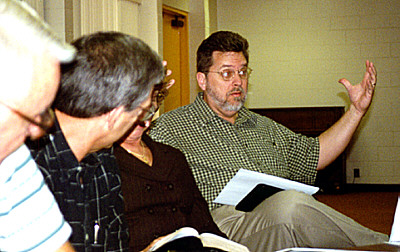General Board of Global Ministries
![]()
UM Information
UM
Reporter
![]()
Florida Southern College
![]()
Bethune
Cookman College
![]()
FL UM Children's Home
![]()
|
|
Common Table begins deliberations over conference-wide vision |
|
Photo by Tita Parham |
| "What is it going to take? What are we going to have to risk?" Those questions, asked by Bob Bushong, (right), pastor of First United Methodist Church, Winter Park, were just a few of the many questions, expectations, hopes and concerns conference leaders considered Nov. 4 at the first Common Table meeting. |
|
By Tita Parham
LEESBURG — Nearly 30 Florida Conference pastors and leaders representing the varied ministry areas of the conference met Nov. 4 at the Life Enrichment Center here for the first meeting of an initiative spearheaded by the Conference Council on Ministries (CCOM) called the Common Table. Guided by Harold Wright, CCOM director of the Desert Southwest Conference, the group began the process of leading the conference in developing a common vision and initiatives all conference churches can support to fulfill the mission of making disciples of Jesus Christ. "We’re not here to define the mission — that’s already been done, Jesus did it. The mission is to make disciples of Jesus Christ," said the Rev. Jim Harnish, senior pastor of Hyde Park United Methodist Church in Tampa and chairman of the CCOM. "We’re here to discuss how we, as leaders of the conference, can more effectively empower and energize the churches of the conference to fulfill that mission…to search what it means for all of our resources to be aligned toward meeting the mission and vision of the conference." After nearly four hours of prayer and reflection and discussion about the meeting’s purpose, the Common Table’s goal, and people’s concerns and expectations, group members decided they needed to meet again to determine the next steps. They also agreed to suggest the names of people they feel could provide input and leadership. The idea for the Common Table came from discussion at the CCOM budget meeting last January. Ministry team chairs said there needed to be a way for conference leaders to decide together how conference resources could more effectively be used to fulfill the conference’s mission and vision. Members attending the Common Table meeting expressed concern over the group’s lack of age and ethnic diversity. No Asian or Hispanic members were present or young adults under age 30. Harnish reiterated that the meeting was only the beginning. "If leadership is not on board, it’s not going to move, so the start was with the leadership of the conference. The process is to…reach out more effectively to our constituents, to listen to our customer," he said. Harnish said Wright was called in to help because "we don’t know how to do this." Wright has worked with 10 other annual conferences that have gone through a similar process, helping them articulate a common vision and develop a plan of "how the whole and parts work together," Wright said. "Our goal is to empower everyone to use their gifts and resources toward a common vision," Wright said. "Our task is not to decide the vision, but articulate and facilitate the process." He said one function of the Common Table is encouraging ongoing dialogue within the conference. When the Common Table group meets again, members will determine the steps involved in the process, which will include sessions to gain feedback from United Methodists of all ages and ethnic groups. Shared goals will be developed using that feedback. Wright says those goals will be communicated to local churches so members have an opportunity to comment. The Common Table will then work to empower and equip churches to meet the goals. Those steps, plus "appropriate organizational change and strategic thinking yields focused, energized mission and ministry with unified leadership and an abundance of resources," Wright said. Bishop Cornelius L. Henderson was unable to attend the meeting, but offered his input in a letter he wrote to the group that was read by Thom Shafer, Jacksonville District superintendent. "All we do at the Common Table should be Christ-centered, Bible-based and people serving," Henderson said. He also recommended that "special goals be set. "These goals should be as such that we have to reach higher and higher," he said. "Yet, the goals should be reachable and attainable." When asked what they hoped the Common Table would accomplish, several group members expressed an urgency to develop the common goals and begin working toward them. Others said they hoped it would reinforce the importance of the connection and Wesley’s emphasis on works of mercy and piety. The Rev. Jacques Pierre, pastor of Lakeland’s Highlands United Methodist Church, said his hope was that the Common Table could be broadened "to represent the constituency of the United Methodist Church so everyone feels that ownership…so that whatever comes out of it is not what the conference is offering, but what we have done." "We have the good idea, but we are so embedded in the old paradigm that it’s hard to become that new butterfly," he said. Lynette Fields, a staff member at St. Luke’s United Methodist Church in Orlando and vice chairwoman of the CCOM, said she hopes the Common Table will produce a clear focus for the conference "so that people know what they’re a part of and can move forward." "The urgency is to share the good news of Christ with the whole world. It’s not to fix the church," she said. Top
of this page |

